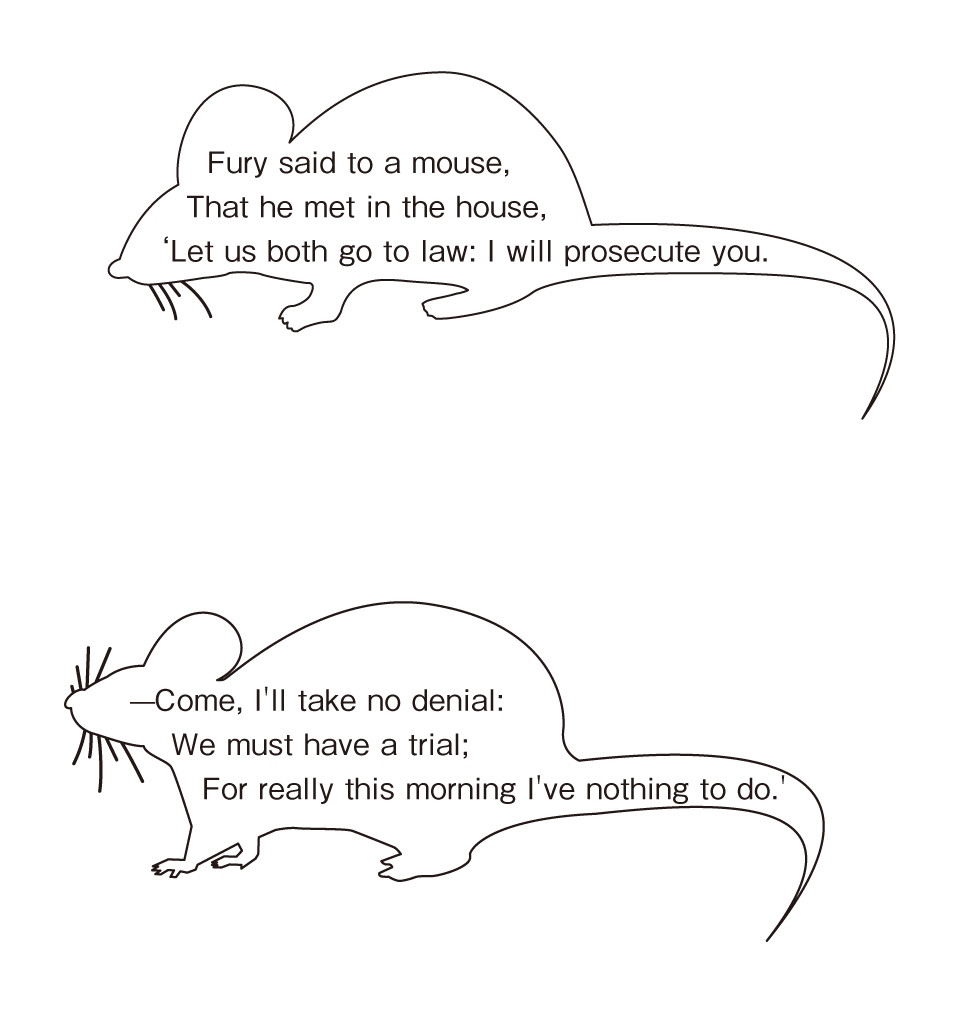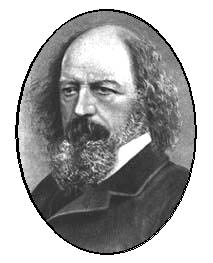這個版本應該是從Martin Gardner譯成日文,再從日文譯成中文,有點隔靴搔癢。我的翻譯也是成尾巴狀,而且全詩押韻:
「發利狗兒在壁櫥,
遇到一隻老鼠:
『咱倆去上法庭,我要把你控訴──
走走不許你耍賴,
我們定要審個明白。
因為今天早上,我實在閒得發呆。』
老鼠向壞狗說道:
『這樣的審判不好,
沒有法官也沒有陪審,你我不過白耗。』
『法官我做陪審我當,』
狡滑的老狗有主張:
『我一人審完全案,判你去上天堂。』」
英文原文:
`Fury said to a mouse,
That he met in the house,
"Let us both go to law: I will prosecute YOU–
「發利狗兒在壁櫥,
遇到一隻老鼠:
『咱倆去上法庭,我要把你控訴──
走走不許你耍賴,
我們定要審個明白。
因為今天早上,我實在閒得發呆。』
老鼠向壞狗說道:
『這樣的審判不好,
沒有法官也沒有陪審,你我不過白耗。』
『法官我做陪審我當,』
狡滑的老狗有主張:
『我一人審完全案,判你去上天堂。』」
英文原文:
`Fury said to a mouse,
That he met in the house,
"Let us both go to law: I will prosecute YOU–
Come, I'll take no denial;
We must have a trial:
For really this morning I've nothing to do."
We must have a trial:
For really this morning I've nothing to do."
Said the mouse to the cur,
"Such a trial, dear Sir,
With no jury or judge, would be wasting our breath."
"Such a trial, dear Sir,
With no jury or judge, would be wasting our breath."
"I'll be judge, I'll be jury,"
Said cunning old Fury:
"I'll try the whole cause, and condemn you to death."'
Said cunning old Fury:
"I'll try the whole cause, and condemn you to death."'
HC:糊塗的奇境仙境分不清《愛麗絲夢遊奇境:用日文賞析世界名著(中日文對照 附日語朗讀情境MP3)》就英文學習而言 有許多地方要註明 譬如說『 in the twinkling of a teacup』 現在罕見了
Howard:文中有許多翻譯得詞不達意的地方,例如:「卡洛爾有生之年出版的《愛麗絲夢遊奇境》,皆會特地在扉頁上寫著「與約翰.坦尼爾42張插圖一起」(WITH FORTY-TWO ILLUSTRATIONS BY JOHN TENNIEL)。」其實是當時的出版習慣,喜歡在扉頁註明「附約翰.坦尼爾插圖42幅。」翻成「與......一起」有點可笑。
「把《愛麗絲地底之旅》中身邊的日常題材拿掉後,就成了《愛麗絲夢遊奇境》,」也是不知所云,《愛麗絲夢遊奇境》是為出版而擴大內容(由12,715 字擴充到26,2113字),反而是情節增加,並沒有拿掉身邊日常題材這回事。
數學家卡洛爾設下的文字遊戲
不能忘了路易斯.卡洛爾(Lewis Carroll)在成為作家前是個優秀的數學家。他想了很多數學家才會聯想到的暗號或文字遊戲,以及難解的謎題。這些對一般人來說難以解讀,因此卡洛爾嘗試用容易理解的方式放在書中。
卡洛爾的學生曾說他能「透過惡作劇把枯燥的課業變得更有趣」。他給孩子說的故事或是餘興創作的解謎遊戲,總讓人立刻就恍然大悟。
《愛麗絲夢遊奇境》(Alice's Adventures in Wonderland)的故事中也隨處可見數學家卡洛爾設下的機關。毫無常識的動物對話、意義不明的閒聊,其實都是卡洛爾的文字遊戲。譬如柴郡貓與愛麗絲的對話(p. 89):「妳剛說『豬』, 還是『書』?」(Did you say ‘pig’, or ‘fig’?);或是法庭上帽匠與國王的對話(p. 153):「⋯⋯一下茶又啵啵發泡⋯⋯」(“ ── and the twinkling of the tea ── ”×)、「你說什麼會啵啵發泡?」(“The twinkling of what?”)、「一開始是茶。」(“It begin with the tea”)、「我當然知道泡茶時茶會啵啵發泡!」(“Of course twinkling begins with a T!”)等等,書中多次出現這種文字遊戲。
~((単数形のみ)) 瞬く間,瞬間
- a twinkling [= twinkling eye/((こっけい)) twinkling a ]
- あっという間に.
故事開端,日常生活有如愛麗絲姐姐正在讀的「沒有插畫也沒有對話」的無趣書本。但讀者跟著愛麗絲腳步忘記那種生活,一下子就沉浸在故事世界中,像是自己也掉進兔子洞一樣。這種不可思議的體驗,就是卡洛爾《愛麗絲夢遊奇境》的魅力。
在這個章節,我們就來介紹一些與數學家卡洛爾埋藏的玄機有關的小故事吧。
卡洛爾講究語言的「聲韻」
英語中有個單字「Rhyme」,意為「聲韻」。 韻就是發音相同或相似的音,在詩或文字中排列這些韻,就稱為「押韻」。對路易斯.卡洛爾來說,語言不只是意思,聲音也是非常重要的一環。《愛麗絲夢遊奇境》中最著名的文字遊戲,就是 Chapter3中與老鼠的對話。在與老鼠說話時,愛麗絲聽成老鼠的尾巴(p. 43),其實是把發音相同的「tale」(故事)聽成了「tail」(尾巴),可說是卡洛爾經典的文字遊戲。更了不起的是,詩中每一段都可以拆成像這樣的老鼠形狀。

全部共有4段,第1段第1行的「mouse」與第2行的「house」押韻,而第3行不押韻。整首詩像這樣押韻2行後1行不押韻,以3行為單位寫成了4段。不過仔細看,下一段的第3行「For really this morning I’ve nothing to do.」這裡的「do」與第1段第3行的「you」又押韻。因此整首詩的結構其實是老鼠形狀的身體彼此押韻,而每一段(第3、第4段也相同)的尾巴又彼此押韻。
發現這個規則的是1989年的美國高中生;這個軼事在1991年5月1日的《紐約時報》(The New York Times)被介紹出來。說不定,《愛麗絲夢遊奇境》裡還有很多不為人知的規則。
只有三姊妹知道的文字遊戲
把《愛麗絲地底之旅》中身邊的日常題材拿掉後,就成了《愛麗絲夢遊奇境》,不過《夢遊奇境》裡還是藏有李道爾三姊妹馬上就會知道的人物、事件與秘密。譬如渡渡鳥。路易斯.卡洛爾長久以來苦於口吃,只有在小孩面前才能順暢地說話;一遇到大人(少年也一樣),口吃就會變得特別嚴重。在自我介紹時常常說成「我是道、道、道德森」的卡洛爾,在書中也投影自己,創造了渡渡鳥這個角 色。
三姊妹當然也作為原型被寫進書中。長女蘿芮娜是鸚鵡,三女是小鷹,然後愛麗絲是主角。與卡洛爾一同出遊划船的同事羅賓森.德克沃斯也作為鴨子登場。這些角色都在Chapter3出現。
而「瘋狂茶會」中睡鼠所說的艾爾希、蕾希、緹莉三姊妹的故事,當然也是取自李道爾三姊妹的名字。艾爾希Elsie=L.C.,等同於蘿芮娜.夏洛特的字首拼寫;蕾希Lacie=Alice更動字母排序;緹莉Tillie=取自伊迪絲小名Matilda。
另外,假海龜與獅鷲所作的跳舞練習,也有三姊妹的家庭教師,普利格特小姐等老師們要求少女們學習的背景。老師們給她們上的「特殊課程」,大概就包含了方塊舞吧。「一閃一閃亮晶晶,滿天都是小蝙蝠」的蝙蝠原型,據說來自有著「蝙蝠」 (bat)的暱稱,以課程極為困難聞名的巴塞洛繆.普萊斯(Bartholomew Price)教授。卡洛爾在書中,放了許多李道爾三姊妹能會心一笑的小插曲。
改編自許多歌曲的諷刺詩
卡洛爾在詩中雖寫了許多詩,但那些幾乎都是有原曲的諷刺詩。
*p. 28的「勤勞的小鱷魚」(How doth the little crocodile),源自詩人以撒.華滋(Isaac Watts)在18世紀為人熟知的《兒童詩歌集》(Divine and Moral Songs for Children)中,一首名為「怠惰與惡作劇的訓誡」的詩,開頭第一句便是「How doth the little busy bee」。
*p. 64的「威廉老爹,你老了」(You are old, Father William),是18世紀的桂冠詩人羅伯特.騷塞(Robert Southey)的教訓詩「何得老男安樂」 (The Old Man’s Comforts, and How HE Gained Them),詩中讚賞一個元氣十足的老人。原詩中也出現Father William。
*p. 82公爵夫人唱的「粗魯對你的孩子說話吧」源自威廉.文森.華萊士(William Vincent Wallace)作曲,大衛.貝茲(David Bates,作詞者有所爭議)作詞的「Speak Gently」。原曲在1846年公開,且與公爵夫人所唱不同,內容是對孩子輕聲細語。
*p. 97「一閃一閃亮晶晶,滿天都是小蝙蝠」 (Twinkle, Twinkle, little bat)戲仿自童謠「小星星」(Twinkle,Twinkle, little star),而小星星則取自在日本也相當有名的珍.泰勒(Jane Taylor)的詩「The Star」中的一節。
*p. 139「你能不能走快點?」(Will you walk a little faster?)源自瑪麗.豪葳特(Mary Howitt)的詩「蜘蛛與蒼蠅」(The Spider and the Fly)。卡洛爾取自本詩開頭「你要來我家嗎?蜘蛛對蒼蠅說」(“Will you walk into my parlour?” Said the spider to the fly)。
*p. 143愛麗絲被獅鷲命令而背誦的「我能聽見龍蝦聲」(This the voice of the Lobster)來自以撒.華滋教訓詩「懶惰蟲」(The Sluggard)。原詩是首訓誡人不應懶惰的詩。
*p. 145假海龜唱的「滑潤鮮濃湯」(Beautiful soup),從詹姆士.M.賽斯(James M. Sayles)作詞作曲,1855年的「夜星」(Star of The Evening)改編而來。原曲是首李道爾三姊妹也朗朗上口的曲子。
*p. 164白兔所讀的詩「他們告訴我,你曾去她那」 (They told me you had been to her),是卡洛爾以當時流行的歌曲,威廉.米(William Mee)作詞的「Alice Gray」為藍本所創作。原曲是首男性戀上名為愛麗絲的少女的悲歌。
在本書中唯一一首直接使用原詩的,就是p. 149的「紅心皇后,做水果塔」(The Queen of Hearts, she made some tarts)。這首是在鵝媽媽故事中也為人熟知的詩,而卡洛爾直接引用了前4行。
順帶一提「夜星」是卡洛爾在「金色午後」之後的1862年8月,聽到李道爾三姊妹哼歌,才得到靈感改編的。「夜晚的星星,美麗的星星」的原詞,被改成了「滑潤鮮濃湯,色綠味豐美」。另外「小星星」原文的 star(星)被改編成 bat(蝙蝠), 因此為了押韻卡洛爾也把第2句的「I wonder what you are!」的「are」改成了「at」。
像這樣,在卡洛爾發揮巧思改編這些歌曲後, 擄獲了當時英國孩子們的心。
卡洛爾設下的關鍵數字「42」
約翰.丹尼爾描繪的《愛麗絲夢遊奇境》全部插圖共有42張,不過其實這個42是卡洛爾堅持要求的數字。譬如紅心國王審判時所說的「規則第四十二條」,原文字母也正好是42個。42張插圖明顯不是偶然,而是卡洛爾特地設定的。卡洛爾有生之年出版的《愛麗絲夢遊奇境》,皆會特地在扉頁上寫著「與約翰.坦尼爾42張插圖一起」(WITH FORTY-TWO ILLUSTRATIONS BY JOHN TENNIEL)。
在故事中出現的撲克牌園丁,是黑桃2、5、7。 把這3個數字加起來再乘以3,正好就是42。另外在小蜥蜴比爾被愛麗絲踢出煙囪,由2隻天竺鼠扶住的場景內(p. 59)也有玄機。天竺鼠英文為Guinea pig,而Guinea其實指的是貨幣單位「畿尼」,在當時等於21先令。21先令×2隻等於42。數學家卡洛爾埋藏這些四處見於文中的小心思似乎相當得心應手。
但為何會是42這個數字,直至目前都尚未解開。不過世界各地的卡洛爾粉絲(他們被稱為Carrollian),總能依循線索找到與42有關的事物。續作《愛麗絲鏡中奇遇》中也有多個與42有關的情節。
卡洛爾所提議的新式文字遊戲
卡洛爾就是這樣一個喜愛文字遊戲的人,即使在《愛麗絲夢遊奇境》之外也毫不保留地展露這個興趣。1868年到1914年的英國週刊《Vanity Fair》曾在1879年3月29日號,刊載了卡洛爾稱為「Doublet」的文字遊戲。遊戲內容是改變某個單字的每個字母,最後變成另一個意思不同的單字。規則是,在兩個字母數相同的單字間,插入數個其他單字,然後串聯起來。聽起來很簡單,但相當耗費腦力。
譬如題目是把「HEAD換成TAIL」,作法就是更動「HEAD」的每個字母,最後聯到「TAIL」。模範解答是「HEAD」→heal→teal→tell→tall→「TAIL」。困難之處在於,每個經過的單字,如 heal(治療)、teal(野鴨)都一定要有確實的意思,字母亦不能互換。盡量用最少的單字數過關。實際上出在《Vanity Fair》的題目,都是「把PIG(豬)趕進STY(豬舍)」「把PEN(筆)浸到INK(墨水)」「把HARE(野兔)做成SOUP(湯)」「讓POOR(窮人)變成RICH(富人)」等,兩個單字間皆有關係的題目。
4月19日號到7月26日號的所有題目皆有獎金,據說每道題目的優勝獎品是校正相本,而二、三名則是普通相本。各位不妨也挑戰看看卡洛爾所想出來這個文字遊戲「Doublet」。
書籍介紹
《愛麗絲夢遊奇境:用日文賞析世界名著(中日文對照 附日語朗讀情境MP3)》,EZ叢書館出版
作者:路易斯.卡洛爾(Lewis Carroll)
以日文賞析150週年的奇幻文學經典名著《愛麗絲夢遊奇境》
完全解析作者生平與創作背景,一探故事蘊含的趣味謎題!
跟著日文朗讀情境MP3,一起掉入神祕的兔子洞吧!
完全解析作者生平與創作背景,一探故事蘊含的趣味謎題!
跟著日文朗讀情境MP3,一起掉入神祕的兔子洞吧!
本書特色
- 中日對照雙語版本,每個段落前附數字標,方便讀者循段對照,日文附假名方便讀者閱讀。
- 完全解析作者生平、創作背景,故事中所埋藏的巧思。
- 穿插由29名新銳日本設計師所構思的故事場景圖,呈現奇幻豐富的愛麗絲世界。
- 附日文朗讀情境MP3。
- 收錄英文原文。








 –]
–]